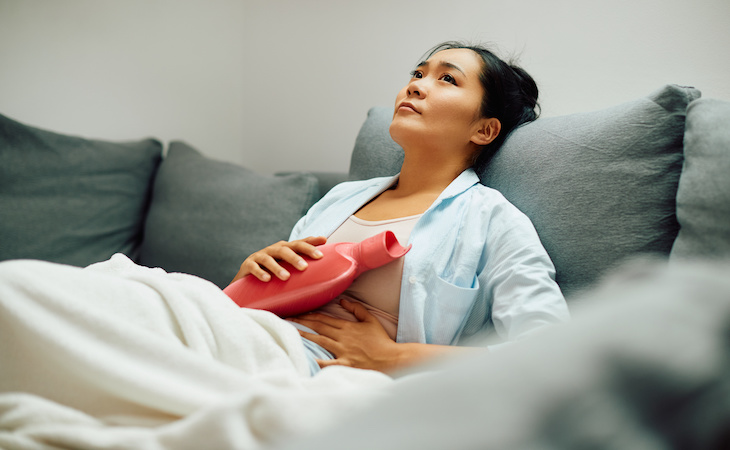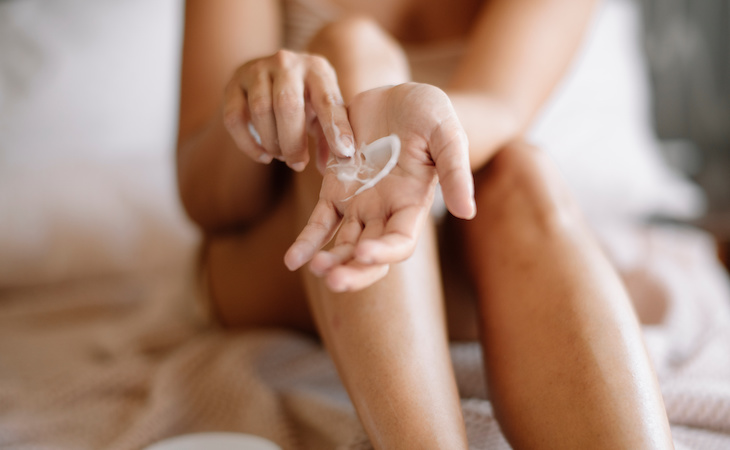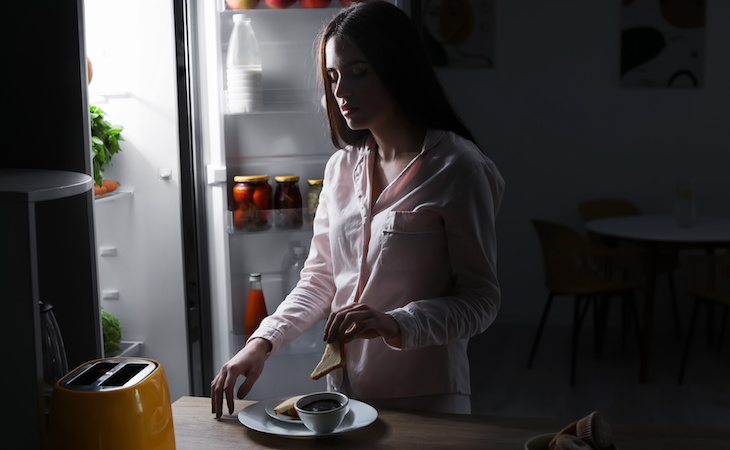As many as one in 10 Americans live with endometriosis, which frequently impacts sleep due to pain and other related symptoms. But this statistic is likely even higher due to delayed diagnosis of up to 11 years in some cases, according to a study published in the American Journal of Obstetrics and Gynecology.
Endometriosis also mimics other conditions such as IBS and UTIs, which can lead to improper treatment. Read on to discover tips for sleeping better with the condition.
What is endometriosis?
“Endometriosis is a chronic condition (causing pain and inflammation) in which endometrial-like tissue grows outside the uterus on other pelvic organs such as the ovaries, fallopian tubes, and behind the uterus,” explains Shaghayegh M. DeNoble, MD, board-certified gynecologist and surgeon with Advanced Gynecology of North Jersey.
Endometriosis impacts roughly 10% of reproductive-aged females and is most commonly found in women in their 20s and 30s. Women of any age can be affected, especially those who’ve never given birth. According to DeNoble, other factors that may increase risk include:
- Irregular menstrual cycles
- Having a close relative with endometriosis
- Heavy menstrual periods exceeding seven days
- Having a condition that blocks the normal outflow of menstrual blood from the uterus
“Although the exact cause of endometriosis is unknown, research suggests that genetics and hormones may play a role,” DeNoble says.
What causes endometriosis?
Possible causes of endometriosis include:
Retrograde menstruation
During menstruation, some endometrial cells flow through the fallopian tubes and into the pelvic cavity (instead of out of the body) where they cause endometriosis, pain, and inflammation.
Hormones
Hormones or other immune factors stimulate the displaced cells lining the pelvic cavity into endometrial-like cells. “Symptoms can ease in mild cases with the onset of menopause since endometriosis is an estrogen-dependent disease,” says DeNoble. “However, more severe cases may not respond to waning estrogen levels.”
Surgery
Endometrial cells can transfer to a surgical scar during a C-section or other uterine surgery.
Immune system disorders
The compromised immune system fails to recognize and destroy endometrial cells growing outside the uterus.
What are the symptoms of endometriosis?
Some of the most common symptoms include:
- Pelvic pain and painful, heavy periods: Pelvic pain can occur one to two weeks prior to the onset of menses and is typically relieved one to two days after menses begins. “But some women experience constant pelvic pain,” DeNoble says. “Low back pain, fatigue, and bloating are also common.”
- Painful intercourse: “Intercourse can be painful deep in the pelvis when the tissues from the endometrium spread in the region behind the uterus and cervix,” DeNoble adds.
- Urinary and bowel problems: Urinary symptoms such as frequency, urgency, and UTI-like symptoms are often overlooked and occur when pelvic nerves that supply the bladder become inflamed.
- Infertility: Up to 50% of women with endometriosis have difficulty conceiving due to scars on the reproductive organs and chronic inflammation.
Although there’s no cure for endometriosis, many treatments can help ease symptoms such as hormone therapy using birth control pills, progestin-only pills, or medications used to block hormones that stimulate ovaries. In severe cases, surgery such as a hysterectomy and removal of the ovaries is performed.
Pain medications and NSAIDs such as ibuprofen can help ease pain and inflammation. “Alternative therapies such as acupuncture, yoga, and massage may be helpful,” DeNoble shares. “Additionally, pelvic floor physical therapy can alleviate many symptoms and address pain syndromes that develop secondary to endometriosis.”
Can endometriosis cause sleep problems?
The pelvic pain alone from this condition can be severe and debilitating and impair sleep, resulting in next-day fatigue and zapped energy. In one study, 65% of those living with endometriosis endured poor overall sleep quality, and study participants also reported excessive daytime sleepiness and insomnia.
How to sleep with endometriosis pain
Thankfully, there are some easy remedies for sleeping better and easing your symptoms, starting with stress-free sleeping quarters and the right mattress.
- Mattress choice: “A good-quality mattress provides support, reduces pain and discomfort, and makes it easy to fall asleep and stay asleep,” DeNoble says. “It’s crucial to find a comfortable and supportive mattress because it makes a real difference in your overall sleep quality.”
- Proper sleep environment: Keep your bedroom cool and dark. Going to bed and waking up at the same time each day will help your body adjust and establish a regular sleep pattern.
- Sleep hygiene: Maintain a consistent sleep schedule, avoid stimulants like caffeine and nicotine, and stash away electronics before bed. Also smart: Reserving the bedroom exclusively for sex and sleep.
- Exercise: Regular exercise helps reduce stress and anxiety levels, which promotes more relaxed sleep.
Best sleeping position for endometriosis
DeNoble shares the best endometriosis sleep positions to reduce pain and increase comfort: sleeping on your back with a pillow under your knees to keep the spine in a neutral position, on your side with a pillow between your legs, and on your stomach with a pillow under your hips.
FAQs
Does endometriosis hurt more when lying down?
Pain can increase when lying down or reclining. Try different sleep positions to find the ones most helpful.
How do you mentally deal with endometriosis?
Combined data from 24 studies showed that higher levels of depression were found in those with endometriosis. DeNoble offers some tips to help ease stress and anxiety:
- Incorporate relaxation techniques into your evening routine such as deep breathing, visualization, and/or mindfulness meditation.
- Take time for self-care and activities such as yoga, journaling, baths, and listening to music.
- Eat a healthy, balanced diet. Nutritious foods can help reduce inflammation and improve overall health.
- Seek help from family, friends, support groups, and/or a mental health professional.
How can I sleep with endometriosis pain?
Let’s recap the best tips to help you get better shut-eye:
- Choose a quality and comfortable mattress.
- Deep breathe, visualize, and meditate.
- Try gentle exercises and take a warm bath in the evening to help promote relaxation.
- Sleep on your back with a pillow under your knees to support your spine.
- Use a heating pad on your abdomen or lower back before bed
- Pain medications and NSAIDs such as ibuprofen can help ease pain and inflammation for more restful sleep.
Autoimmune diseases can lead to insomnia, fatigue, and more. Learn how to sleep better with an autoimmune disease.









